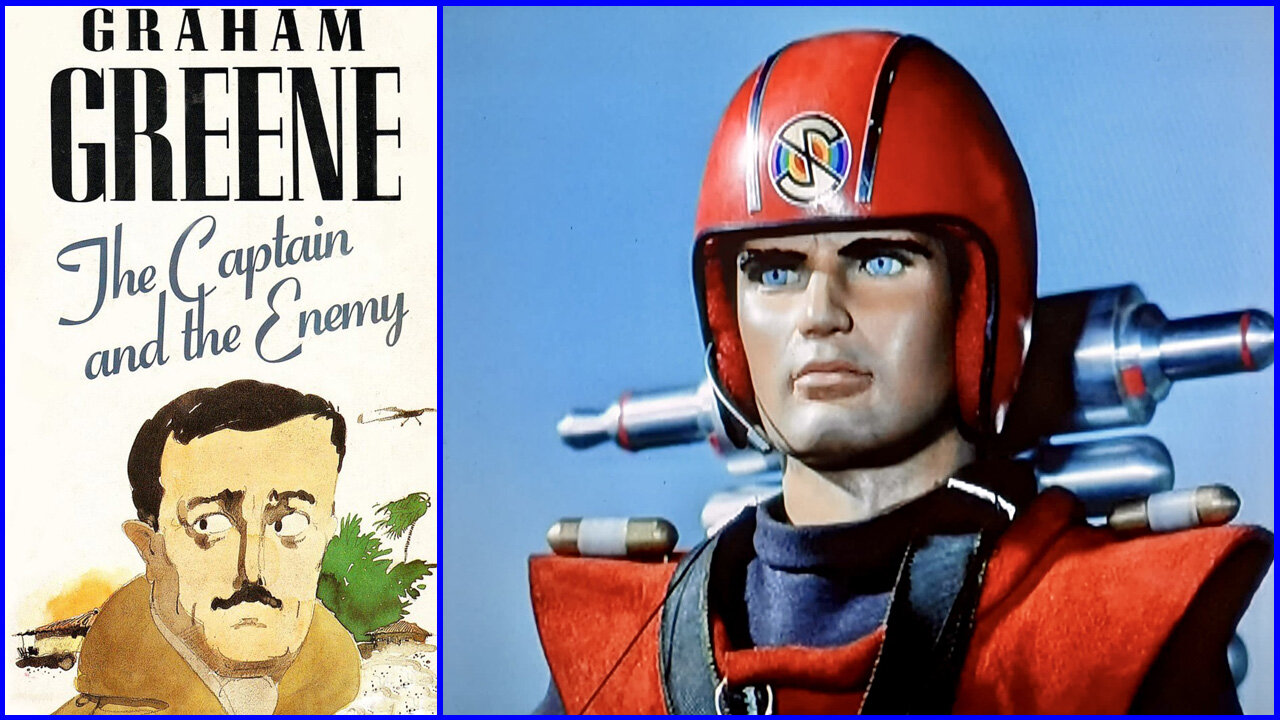Premium Only Content

'The Captain and the Enemy' (1988) by Graham Greene
'The Captain and the Enemy' is Graham Greene’s final novel, published in 1988. It is a mysterious and reflective work that blends elements of adventure, identity, and emotional ambiguity, though it diverges from Greene’s more famous political and moral thrillers. The novel explores love, deception, and loyalty while maintaining Greene’s characteristic themes of moral complexity and personal conflict.
Plot Overview: The story is narrated by Victor Baxter, a young boy attending boarding school. One day, an enigmatic figure known only as "The Captain" unexpectedly arrives to take Victor away, claiming he has "won" the boy from his father in a backgammon game. This event propels Victor into a strange new life with Liza, a troubled and mysterious woman whom the Captain calls his "wife" but whose relationship with him remains unclear.
As Victor grows up in a shadowy world shaped by the Captain’s influence, he struggles to understand the complicated relationships between himself, the Captain, and Liza. The Captain, a man of dubious legality and secretive pursuits, constantly moves in and out of their lives, often engaged in vague and potentially criminal schemes. Despite his flaws, he exerts a charismatic hold on both Victor and Liza.
The narrative eventually shifts to Panama, where Victor, now an adult, becomes entangled in the Captain’s final, desperate act involving political intrigue and betrayal. The story concludes on a tragic and reflective note as Victor attempts to piece together the truth of his upbringing and the mystery of the Captain’s identity.
Themes and Interpretation: Identity and Belonging: Victor’s uncertain origins and the Captain’s ambiguous role as a father figure raise questions about how we form identities in the shadow of other people’s secrets.
Power and Manipulation: The novel’s title reflects the power struggle between the Captain and unseen forces in his life—whether legal authorities, Liza’s influence, or Victor’s gradual independence.
Moral Ambiguity: Like much of Greene’s work, the novel dwells in the gray areas between right and wrong, as the Captain’s criminality is balanced by moments of tenderness and vulnerability.
Love and Loyalty: The complex emotional ties between Victor, Liza, and the Captain form the novel’s emotional core, exploring how loyalty can both bind and trap people.
Tone and Style: Greene’s writing is introspective and elegiac, with a tone that suggests both nostalgia and unease. Unlike the fast-paced espionage of The Quiet American or The Human Factor, this novel unfolds slowly, emphasizing character psychology over plot mechanics. The Captain remains an elusive figure, and Greene deliberately leaves questions unanswered, reinforcing the novel’s themes of secrecy and deception.
Strengths: Complex Characters: Greene excels in crafting morally ambiguous figures, and the Captain is one of his most enigmatic creations—a blend of charm, menace, and melancholy.
Emotional Depth: The novel is haunted by loss, as Victor reflects on the emotional costs of his unconventional upbringing.
Philosophical Undertones: Beneath the surface, Greene engages with questions of freedom, fate, and the impact of parental figures on identity.
Weaknesses: Fragmented Structure: The narrative is at times disjointed, especially as it shifts from Victor’s childhood to adulthood and the political intrigue in Panama.
Lack of Resolution: Some readers may find the novel’s ambiguity frustrating, as Greene leaves much about the Captain’s motivations and identity deliberately obscure.
Slower Pacing: Compared to Greene’s thrillers, this book is quieter and more reflective, which may disappoint those expecting action or suspense.
Conclusion : The Captain and the Enemy is a poignant, reflective novel that serves as a fitting coda to Graham Greene’s literary career. It is less concerned with espionage or politics than with personal mystery and the emotional weight of loyalty. While the novel’s elusive narrative and unresolved questions may frustrate some readers, others will appreciate its emotional subtlety and philosophical depth.
Verdict: A haunting, character-driven novel that explores the complexities of love, loyalty, and identity—ideal for readers who value psychological nuance over plot resolution.
-
 6:19:17
6:19:17
SpartakusLIVE
7 hours agoSaturday SPARTOONS || WZ to Start - REDSEC or ARC Later???
28.3K -
 19:23
19:23
Clintonjaws
1 day ago $15.09 earnedKaroline Leavitt STOPS Trump's Meeting & Grills Reporters Leaving Them Speechless
34.5K23 -
 2:02:09
2:02:09
DLDAfterDark
4 hours ago $1.80 earnedYou Keep a GUN Inside Your Draws?? Let's Talk About Your Tactical Undies
13.9K5 -
 7:02:59
7:02:59
DeadMomAlive
9 hours agoFace Paint Satur-SLAY! Fall Pumpkin! #BIRTHDAYMONTH
21.7K4 -
 2:10:24
2:10:24
RiftTV
9 hours agoThe Death Rattle Of Con Inc BEGINS | SLIGHTLY OFFENSIVE
45.6K10 -
 3:04:43
3:04:43
Mally_Mouse
14 hours ago🌶️ 🥵Spicy BITE Saturday!! 🥵🌶️- Let's Play: Shift Happens
76.4K5 -
 2:35:02
2:35:02
TinyPandaface
1 day agoYour FACE is a Gaming Channel! | Homebody - Part 4
6.88K5 -
 2:56:32
2:56:32
Welcome to The Continental
6 hours ago🟩 ARC and Raiders 🐔
6.16K3 -
 2:52:09
2:52:09
NewsTreason
5 hours agoDECLAS w/ Rambo & Dave: The Nuclear Option End Game | Future Proves Past: Subpoenas Fly, 8pm EST
53.8K68 -
 40:06
40:06
Tundra Tactical
8 hours ago $1.62 earned🛑LIVE NOW!! Honest Gun Company Slogans Gun Mad Libs and Much More
4.38K3